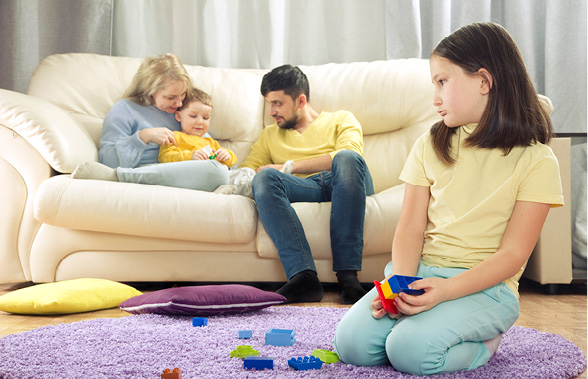Impact on siblings
When a child has a serious illness, every part of their siblings’ lives is affected. Normal routines may change because of their brother or sister’s needs

When a child has a serious illness, every part of their siblings’ lives is affected. Normal routines may change because of their brother or sister’s needs. Other people may help with cooking, driving, or child care if their parents are busy or in hospital. Siblings may also take on new or extra responsibilities. Sometimes, new responsibilities make them feel proud of being able to help. But sometimes these extra responsibilities add to the feeling of things being “different.” Just like their parents and the child who is ill, siblings will notice changes to important relationships.
- Relationship with the child who is ill – may be strained by:
-
- Feeling jealous of the attention that is given to child who is ill
- Changes in the ill child’s abilities and energies that affect the activities they can do together
- Changes in roles from being active playmates to being entertaining companions, or becoming caregivers who help with the ill child’s physical or medical care
- Relationships with other family members – may be strained by:
-
- Being separated while the ill child is in hospital with a parent or caregiver
- Changes to routines like going to school, bedtimes and meals
- Feeling left out, isolated or neglected
- Relationships with peers – may be strained by:
-
- Not knowing how to talk about their feelings or about what’s happening with their sibling
- Feeling that others can’t understand, making it hard to relate to friends
- Missing school, extra-curricular, or social activities
Your children use their minds to make sense of, and adapt to, changes and stresses even when they are focusing on something else, including when they are sleeping. Their thoughts and feelings can lead to:
- Difficulty concentrating
- Difficulty falling or staying asleep, or having nightmares
- Tiredness
- Stomachaches or changes in eating patterns
- Headaches
- Changes in energy levels – having more or less energy
- Changes in toileting habits
These reactions are common. They are not permanent. They are signs that your child is going through something difficult and that they need help to:
- Understand what is happening with their brother or sister and their family
- Express their feelings
- Adjust to the changes in their lives
When a child has a serious illness, your other children will have a wide range of feelings that can change from moment to moment, and may be the strongest feelings they have ever felt. It’s often hard for children to know what they’re feeling, how to describe it, and to know whether or not they should talk about their feelings. When they are “full” of feelings that are intense, new, or uncomfortable, those feelings may come out in different ways. They need the adults around them to be as calm and patient as possible in order to help them feel safe and supported through this difficult experience.
Below are some common feelings that your children may have, and ways you can help.
Your child might have strong feelings about how things have changed. They might worry about how things will continue to change, and what bad things might happen.
How to help
- Tell your child that the feelings they have – no matter what they are – are totally natural.
- Share some of your own feelings to show that it’s okay to have a range of feelings and to show that you are willing to talk about them. Explain that it’s not their job to make you “feel better.”
- Tell them that you are sharing your feelings as a way to encourage them to share their feelings with you. That way, you can talk together about how this experience affects each of you. Tell them it’s natural for different people to have different feelings. It doesn’t mean that one person’s way of feeling is “right” and another’s is “wrong”.
Your child might wish to be able to “do more” to help their brother or sister or to help the family as a whole. Many siblings feel this way even when they are very involved in providing physical care, or take on extra responsibilities.
How to help
- Tell your child how they are helping. Many children think “helping” means providing direct physical care to the child who is ill. Explain that they also help when they spend time with their sibling, or do things like help around the house, or take care of pets.
- Ask how they want to help. Listen to their ideas. If some ideas aren’t suitable depending on your childs’ age or size, talk about how you could change the ideas or help them do the things they’d like to do.
- Talk about their feelings. Sometimes siblings realize they’re already doing everything they can, but they still wish they could do more. Tell them this is a natural feeling, and let them know if you feel the same way.
Your children may feel overwhelmed by their feelings, responsibilities, questions, or worries about the future. It’s hard to balance homework, helping with their brother or sister, household chores, and other expectations. Even if they want to help, over time, they may feel overwhelmed.
How to help
- Tell your child that it’s natural for things to feel stressful when your family is going through such a difficult time. Explain that thoughts, feelings, worries and tasks can swirl around in our minds. If we don’t have a way to let them out, they can feel like they’re multiplying.
- Ask your child to write or draw a list of their feelings, worries, and responsibilities.
- Talk about each item on the list. Tell your child that their worries and feelings are natural and “okay”.
- Look at the list of their responsibilities together. Thank them for what they do and tell them how they are helping you and the family.
- Ask if there are responsibilities that feel like they are “too much”. Talk about how these tasks could be made easier, or if someone else could do them? Talk about which things they do want to keep doing.
- Make a new list of responsibilities that feels more manageable.
- Choose a time to “check in” a few days or a week later.
- If there are worries or questions that you can’t answer yet, keep a list and talk about them again when you can.
Your child may feel that lots of things in their lives are out of control. They might feel anxious because they can’t change what’s happening to their brother or sister, or control how what’s happening affects them, their feelings, their activities, or your family. You can help by finding ways to let them make some choices and have a chance to say, “no” to some things too. These choices will help them feel more in control.
How to help
- Give your child control over smaller choices like:
-
- What to wear
- Which book to read at bedtime
- Which chore to do first
- Whether or not they want to visit with someone
- Include your child in making bigger choices and decisions like:
-
- How and when they would like to spend their time with their brother or sister
- Who they’d like to look after them if you’re not there
- Keep limits and expectations as consistent as possible. It’s tempting to let your child “get away with” behaviour or to give them gifts to make them feel better. It’s very hard to do this, when so much has changed and is out of your control. It’s hard to say no to gifts when they make your child happy and make the gift-giver feel like they are helping the child. But your child will feel safer and more comfortable if they know that your expectations are the same, even though everything else has changed.
- Keep routines like bedtimes, homework and meals, as predictable as possible. If routines change often, use a calendar, or tell your child the plan for each day, so they know what to expect.
Siblings often feel jealous of the extra attention their brothers or sisters get when they are ill. Reassure your child that it’s natural to feel jealous of the attention or special treatment their brother or sister gets.
How to help
- Make sure that they know that you love them, and that they deserve as much care and attention as the child who is ill, even if you haven’t had enough time to spend with them lately.
- Ask if there are things that make them feel especially jealous, or times when they miss your attention the most. There might be things you could clarify or change.
- Plan to spend some time together each day, even if it is as short as 15 minutes. If you can’t be together in person, arrange to talk by phone or video chat.
People feel guilty when they do something wrong. Some children feel guilty because they think they caused the illness. Some feel guilty because they think they have the “wrong” feelings about their sibling, such as anger or jealousy. They might also feel guilty about how they expressed those feelings, if they have hurt someone else.
How to help
- Talk to your child about what they know about the illness. They may think they caused the illness because of something they thought, said or did. For example, if they wished something bad would happen to their sibling when they were fighting, they might think that was why their sibling got sick. Tell your child that no one can cause an illness with their actions, wishes or thoughts.
- Talk to your child about their feelings about the illness. Tell them they don’t have to feel guilty about any of their feelings. But if they have let out their feelings in a way that hurts someone else, talk about how feeling guilty is like feeling “sorry”. Help them learn ways to express their feelings.
- Talk again another time. It usually takes more than one conversation to let go of feelings of guilt.
Siblings of children who are ill often feel that no one understands what they are going through. Their friends might not know about the child’s illness or might not understand how it affects the family. Your child may feel different from friends who cannot relate or don’t know what to say or how to help. They may feel that their perspective, priorities, family, and feelings have all changed. As one teenager said, “I can’t stand to hear them worry about what they’re going to wear to a party when I have something like this to worry about.” Siblings also struggle with feeling self-conscious, and even when people treat them “better” than before, they usually wish to be treated “normally”.
How to help
- Help your child spend time with people they feel comfortable with. Let them know it’s okay to say “no” to people or activities that don’t feel comfortable right now.
- Offer to talk to your child’s friends or classmates to explain what’s happening.
- Help them plan or practice what to say to their friends themselves. Conversations like this help to show that it’s okay to talk about the illness.
- Encourage other people to treat your child the way in the usual way to help them feel as “normal” as possible.
Just like you, your child may worry about things that will happen, like hospital visits or treatments, or things that might happen, like changes to their brother or sister’s condition. Many siblings worry about whether their brother or sister will die, even if it is not likely to happen soon. Sometimes siblings think that talking about their worries will make them happen.
How to help
Let your child know that you would like to be able to talk about any worry that they might have. Tell them that:
- You won’t be angry with them no matter what they tell you.
- Saying things out loud doesn’t make them come true.
- It is better to feel worried or sad together, than to feel that way alone. No matter what they might be thinking or worrying about, you’d like to share it with them.
Read more
Resources
- Staying Connected Handbook (pages 44-47) - Brain Child












